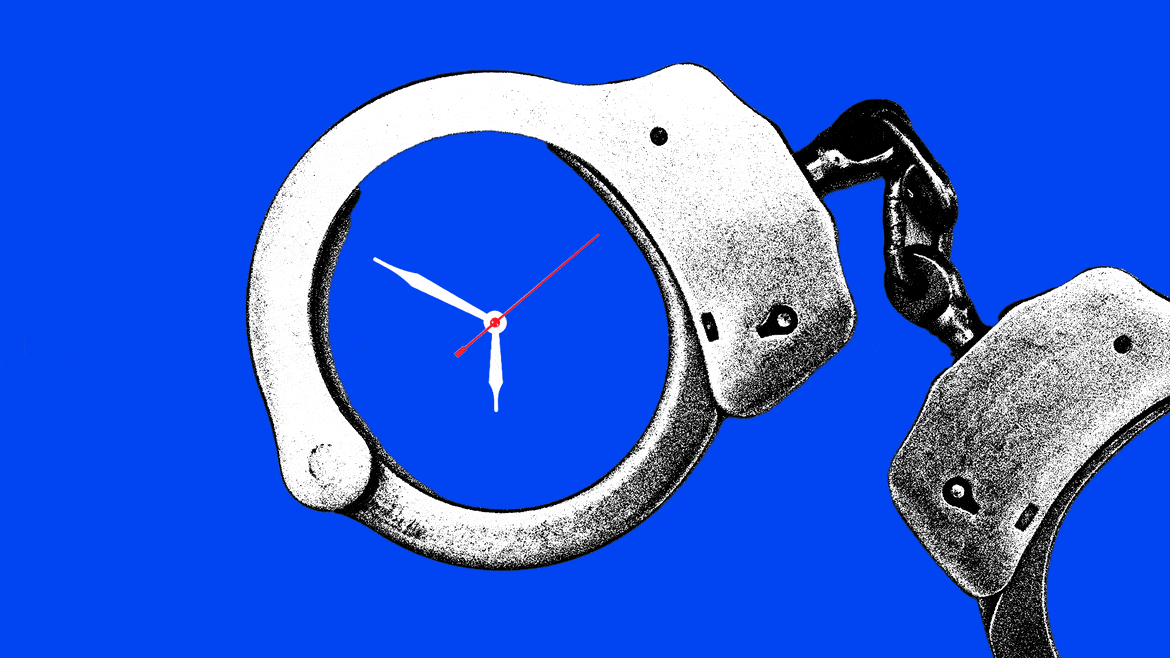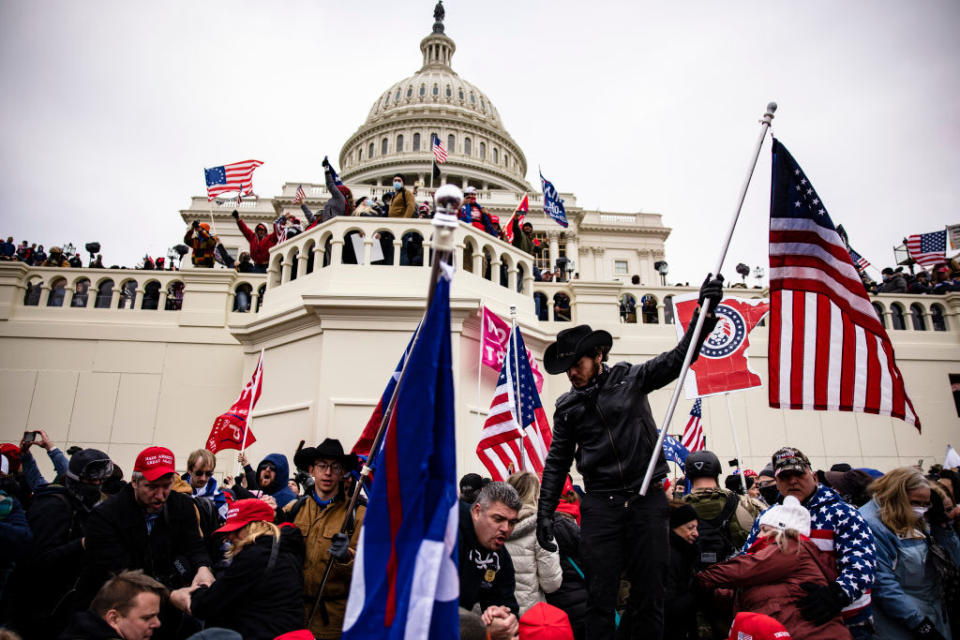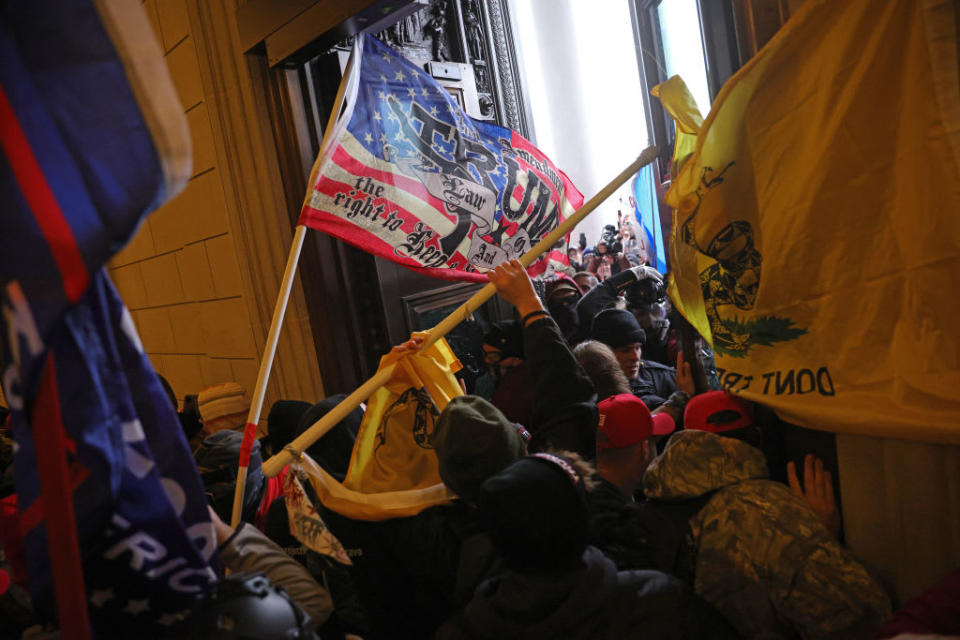Why Have FBI Arrests Slowed Down for Jan. 6 Suspects?

When Salt Lake City police questioned John Banuelos in the fatal stabbing of a teenager on July 4, 2021, he confessed to the killing, claiming self-defense. Then he asked detectives an unusual question.
“Man, should I just tell the FBI to come get me or what?” Banuelos asked, according to an interview transcript first reported by Utah’s KSL.
The FBI was indeed looking for Banuelos. Five months earlier, it had uploaded pictures of him to its “most wanted” page of suspected participants in the Jan. 6 Capitol riot. Banuelos had been filmed flashing a gun at reporters on Capitol grounds, in apparent violation of a firearms ban. Soon after the FBI uploaded Banuelos’ picture, internet sleuths identified him and sent his name to the agency. And in his interview with Salt Lake City Police, Banuelos appeared to confirm that identity, suggesting police “look me up.”
“Yeah, I went inside and I’m the one with the video with the gun right here,” he told officers.
Here It Is, Folks: The Most Unhinged Reaction to Trump’s Jan. 6 Indictment
He wasn’t charged in the stabbing. And two years later, he hasn’t been charged in the Capitol riot, despite the publication of his name or his appearance on the FBI’s “most wanted” page, which describes him as a suspect in an assault on a member of the media. Hundreds of other suspects on the list also remain at large, despite online sleuths claiming to have identified them and passed their names to the FBI.
This July, the statute of limitations on most Jan. 6 cases passed the halfway mark, prompting concern from sleuths like those who identified Banuelos—as well as from former FBI agents.
“We hear people like Director Wray saying, ‘We’re approaching this as a big deal,’” a former high-ranking FBI official who requested anonymity told The Daily Beast, “but I’m not convinced that sense of urgency is being conveyed sufficiently to certain elements of the bureau. Or if it is, and it’s not being actioned, that’s an even bigger problem.”
Online investigators, who claim to have identified many of the people on the FBI’s “most wanted” site, expressed similar frustrations.
After the Capitol attack, self-described “sedition hunters” took information straight to FBI tiplines and avoided interacting with reporters, for fear of complicating the criminal cases, said one sleuth.
“But I think that latter view is changing,” the volunteer investigator told The Daily Beast. Like many in his community, he requested anonymity for fear of retribution from the right. “There’s a lot more impatience toward the FBI, given that we’re two-and-a-half years in at this point. Many of these IDs have been sitting in an inbox for two years, or those people have not been arrested. It can be a bit frustrating.”
By March 2023, online investigators had identified more than 100 still-at-large suspects according to USA Today.
Another online investigator who requested anonymity told The Daily Beast that frustration had spiked in her community this spring. That’s when a Republican-led House subcommittee on the “weaponization of the federal government” began taking aim at the FBI’s Jan. 6 investigations, accusing it of overreach.

Pro-Trump protesters storm the U.S. Capitol following a rally with President Donald Trump on Jan. 6, 2021, in Washington, DC.
“We had 27 arrests in January. We had 15 arrests in February. We had 19 arrests in March,” she recalled. “And March is when the Republican Weaponization Committee began attacking the FBI and the DOJ saying they were weaponizing the federal government and seeking to defund the FBI and the DOJ. Then came April; we had only 13 arrests. In May, we had only six arrests.”
Arrest rates rebounded in June and July, with the DOJ pressing charges against more than 80 people. But the dip made some observers nervous about political pressures facing the investigation.
Testimony before the Weaponization Committee revealed deep rifts in FBI attitudes toward the Jan. 6 investigations, the Wall Street Journal reported in March. During those hearings, several former FBI officers (including two who have lost their security clearances under disputed circumstances) testified that some agents and field offices disagreed with investigation tactics, at time refusing requests from other field offices in the case.
Reached for comment, the FBI told The Daily Beast that “investigating the violent assaults on law enforcement officers, obstruction of justice, seditious conspiracy, and multiple other federal crimes committed during the January 6 attack on the Capitol has been and remains a priority for the FBI. We work closely with the prosecutors who bring charges, and as of last month more than more than 1,069 defendants have been charged for criminal activity on January 6. Additional details can be found on DOJ’s website at https://www.justice.gov/usao-dc/30-months-jan-6-attack-capitol.
“We are asking for continued help to identify other individuals for their role in the violence at the U.S. Capitol and encourage the public to visit https://www.fbi.gov/wanted/capitol-violence for images and video of these suspects. Anyone with tips can call 1-800-CALL-FBI (800-225-5324) or visit tips.fbi.gov. As we have seen with numerous cases, the tips matter.
“Additionally, the FBI is and will always be independent. While criticism often comes with the job, we will continue to follow the facts wherever they lead, do things by the book, and speak through our work.”
The Capitol riot investigation is the largest case in the FBI’s history, experts noted.
“It’s a mammoth undertaking,” said David Shapiro, a former FBI agent who now serves as Distinguished Lecturer at John Jay College of Criminal Justice. He pointed to the extraordinary volume of evidence from the attack. “How many witnesses are involved, how much digital evidence, how much testimonial evidence? All of this stuff has to be digitized, organized, indexed, copied, distributed among multiple field offices of the bureau.”
More than 1,000 people have been charged in relation to the Jan. 6 attack. Still, hundreds of people from the FBI’s “most wanted” list, alone, remain at large. Most of those remaining cases involve potential charges of assaulting a federal officer. The felony—one of the Capitol attack’s most serious charges—has a five-year statute of limitations that passed its midway point last month.
And arrests rates in Jan. 6 cases have slowed. In the first year after the attack, prosecutors charged just over 700 people for their alleged involvement in the riot. In 2022, fewer than 250 new suspects faced charges.
Mike German, a former FBI agent, noted that many of the early arrests were for less serious offenses like trespassing on Capitol grounds. The trend, combined with reports that suggested the FBI had missed signs of the impending attack, suggested to German that investigators “didn’t have a coherent view of the larger conspiracy in the beginning,” he told The Daily Beast.

MAGA protesters attack the U.S. Capitol to try to impede Congress from ratifying Joe Biden’s Electoral College win over Donald Trump.
“They were treating this like, ‘OK, this is a bunch of otherwise good people who got caught up in the moment and got outta hand.’ We’ll charge the ones who are most prominent by walking into the Capitol and videotaping themselves and putting their criminal activity on social media, to send a message that we’re taking this seriously.”
The FBI has insisted from the investigation’s earliest days that it is prioritizing the case. Throughout the investigation, the agency has promoted its tipline. “The FBI is seeking the public’s assistance in identifying individuals who made unlawful entry into the U.S. Capitol building and committed various other alleged criminal violations,” the FBI’s website reads.
But the former high-ranking FBI official told The Daily Beast that he had heard of individual FBI field offices displaying less enthusiasm for the case.
“I know there were questions from leadership of field offices that were far away [from D.C.], which maybe had only one or two cases,” he said, describing field office leaders as asking questions like “‘This is a misdemeanor charge, why are we pursuing this?’ ‘The guy only went into the Capitol.’ ‘How come we didn’t do this sort of thing with the antifa 2020 protesters?’”
In those cases, the former official said, national FBI leadership reassured the field offices that they had pursued the left with equal vigor.
FBI leadership has forcefully denied the right’s allegations that it is mishandling Jan. 6 investigations, with Wray calling some Republican claims about the FBI’s Jan. 6 involvement “ludicrous.”
Still with the statute of limitations in most Jan. 6 cases now halfway through, former FBI officials are underscoring the risk of letting the remaining suspects skate.
“This insurrectionist rhetoric hasn't slowed down,” German, the former agent said. “So as we have more elections coming up, the more these individuals feel that they’re immune from prosecution, the more aggressive they’ll act.”
Indictment Mystery: Did Someone Spill About the Trump-McCarthy Jan. 6 Call?
Some, including identifiable figures like Banuelos, have been arrested in other incidents after Jan. 6. Another man, according to an independent investigation reviewed by The Daily Beast, is wanted by the FBI for alleged assault on a federal officer at the Capitol, but has so far only been arrested on charges in an unrelated case in Arkansas.
The former high-ranking FBI official said “it doesn’t make a lot of sense” why some of the identifiable suspects remain at large. He added that the issue couldn’t be attributed to a single apathetic agent, but an overall lack of urgency at the FBI.
“If a case agent is not motivated in Kansas somewhere, shame on him or her. But ultimately, that’s a leadership issue,” he said. “It’s a question for the leadership of the office. It’s a question for the leadership of the FBI. And it’s not acceptable. Particularly if we start hitting the point of statute of limitation issues, I think it’s inexcusable.”
Get the Daily Beast's biggest scoops and scandals delivered right to your inbox. Sign up now.
Stay informed and gain unlimited access to the Daily Beast's unmatched reporting. Subscribe now.

 Yahoo News
Yahoo News 
